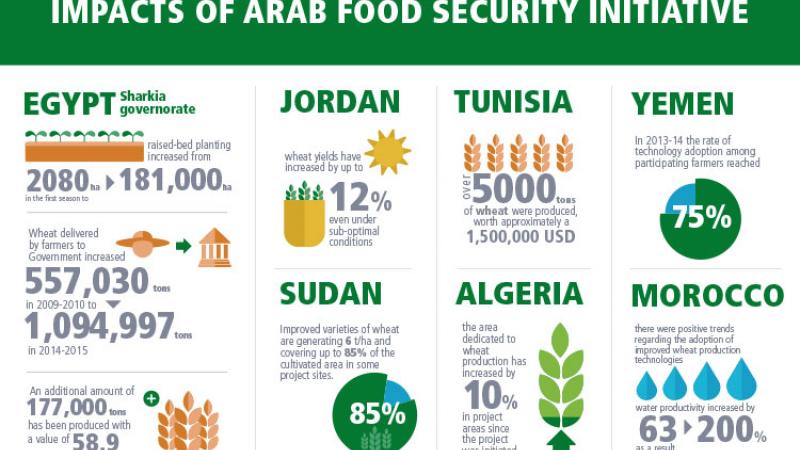Coalition of donors committed to enhancing food security in Arab Countries

The partnership between the Arab Fund for Economic and Social Development, the Kuwait Fund for Arab Economic Development, the Islamic Development Bank, the OPEC Fund for International Development, the Bill and Melinda Gates Foundation and ICARDA is demonstrating significant development outcomes.
The Challenge: Reducing wheat imports in the Arab region
Farmers across the Arab region face multiple production constraints: a degraded natural resource base, chronic water scarcity, variable weather patterns, and a range of pests and diseases which severely affect the production of staple crops – especially wheat. The result is a large and growing import burden that undermines food security and exposes countries to the vagaries of global commodity markets.
The ‘Enhancing Food Security in Arab Countries’ initiative is working with national partners to reverse the poor performance of the region’s wheat production across ten countries: Egypt, Iraq, Jordan, Morocco, Palestine, Sudan, Syria, Tunisia, and Yemen.
The Approach: An inclusive partnership
Initiated in 2011, ‘Enhancing Food Security in Arab Countries’ promotes proven technologies and strategies – including improved varieties that are high-yielding and tolerant to a range of biotic and abiotic stresses; sustainable agronomic practices such as conservation agriculture and raised-bed planting; and the more efficient use of scarce water resources, through improved irrigation and water management systems.
The initiative recognizes that effective technology transfer systems are essential – not just between researchers and farmers, but also between farmers and other farmers. The out-scaling approach of successful technologies involves a wide range of advanced information and communication tools, and is tailored to the specific conditions of each participating country.
The Impact: Raising yields and productivity
Results over the past six years have been significant. During the initiative’s first phase (2011-14), average yields across all large-scale demonstration sites increased by 28%, with a maximum yield increase of 75%. These gains held up during the first and second growing seasons of the initiative’s second phase (2014-2018) when the average yield increase was also 28%, and the maximum yield increase was 59%.
- In Egypt’s Sharkia governorate - raised-bed planting increased from 2080 ha in the first season to 181,000 ha in 2014/15; the wheat delivered by farmers to Government increased from 557,030 tons in 2009-2010 to 1,094,997 tons in 2014-2015; and an additional amount of 177,000 tons has been produced with a value of 58.9 million $US.
- In Jordan – wheat yields have increased by up to 12%, even under sub-optimal conditions.
- In Morocco – there were positive trends regarding the adoption of improved wheat production technologies; water productivity increased by 63-200% as a result.
- In Sudan – improved varieties of wheat are generating 6 t/ha and covering up to 85% of the cultivated area in some project sites.
- In Tunisia – over 5000 tons of wheat were produced, worth approximately 1,500,000 USD.
- In Yemen – the rate of technology adoption among participating farmers reached 75% in 2013-14.
- In Algeria – the area dedicated to wheat production has increased by 10% in project areas since the project was initiated.

Farmers pleased with the harvest of wheat obtained through Arab Food Security Project in Egypt
Communication: Scaling-out improved technologies
In order to enhance the dissemination and uptake of the new technologies, ICARDA and its National Agricultural Research System partners work closely together to define and streamline innovative extension methodologies, taking into account the specific information needs, cultures and services available in each country.
Besides traditional dissemination approaches, ICARDA and its partners channeled information via farmers’ growing use of cell phones. In Tunisia and Sudan information was disseminated via text messages and WhatsApp applications to allow farmers to access technical information on appropriate production practices in real time, and manage agronomic operations such as water irrigation timely. Results recorded during the 2015-2016 cropping season in Tunisia showed that farmers who followed the SMS technology in managing their irrigated wheat crop increased their yield by more than 50%.
The Outlook: Capitalizing on value for money
Returns on investment have been impressive: an initial investment of 5.3 million USD has generated an estimated additional in-pocket gain of 54.2 million USD for farmers in Egypt, Tunisia, and Jordan. Additional estimates suggest that achievable gains could reach 61.4 million USD across Sudan, Syria, and Morocco. A recent impact study of raised bed technology showed that Egyptian wheat producers’ benefits could reach the level of US $4.5 billion in a 15-year project horizon, and that these benefits could be shared by more than 1 million farmers by 2023. (Alwang and al, 2017).
The initiative is focusing on long-term impacts by prioritizing the capacity strengthening of farmers and extension and technical staff from agriculture-related ministries, institutions and associations. This approach – which has already reached over 45,000 beneficiaries and an additional 19,000 technicians, researchers and policy-makers - includes country and regional training activities, inter-country scientific visits, traveling workshops and symposia, farmer field schools, and field days. Young researchers are also targeted – through the Young Agricultural Scientists Program (YASP), which has allowed 48 young scientists to be trained in advanced institutions and laboratories throughout the region. The training covers various scientific topics and themes related to improving the productivity of wheat based systems.
The initiative is now looking to build upon its successes: extending its reach and ensuring that more farmers, and extension and technical officers have access to the project’s technologies and innovations. In its second phase, it plans to scale-out innovations to cover more wheat-growing areas in participating countries - helping to raise productivity on an even wider scale and improve the livelihoods of millions.
The International Center for Agricultural Research in the Dry Areas (ICARDA) is a global agricultural research organization working with countries in the world’s dry and marginal areas to deliver sustainable systems solutions that increase productivity, improve rural nutrition, and strengthen national food security. ICARDA is a member of CGIAR, a group of 15 international agricultural research centers that produce public goods science. www.icarda.org



